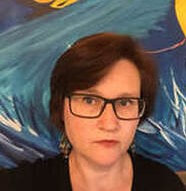Sacred Chickens
Menu
SACRED CHICKENS
 Are We the Baddies? by Julie Carpenter This blog post is an older one, but I've been thinking a lot about narrative and empathy lately. In fact, Jarad, Morty, and I are thinking about doing a series of posts about the intersection of narrative, literature, politics and reality in general. So I decided to repost. I wrote my master’s thesis on the use of narrative as an argumentative device. I believed then, and still believe, that stories are the best way to convince someone else of your truth, the best way to come to any idea at all of what the truth might be. Stories add layers of complexity. Narrative allows us to see that every person has choices to make but at the same time they are victims of the choices of other individuals, families, and societies, or even the natural world. Story embraces the paradox of life. Many things can be true at once when you see them in a narrative context. Life is messy and much more like a web than straight line. Stories create empathy and acceptance. Teaching your child to read, especially stories that are written with the perspective of a particular character or characters in mind, not only promotes academic success, but also empathy. This empathy that we gain from reading should lead to greater understanding of others, but it should also lead to greater understanding of ourselves. To put it more bluntly, after you read a story…you might find that you have traits in common with the villain - as many as you do with the hero. You might BE the villain. The more I write stories, the more I realize that there’s only one place to go fishing for the sins and follies of the characters and that’s in the depths of my own dark heart. Why do I point this out? Because being a human, I find that this is not the way we (I) like to read stories. For goodness sakes, if Cinderella’s stepmother read the story of Cinderella, she would probably identify with Cinderella. She might take a moment to consider how unfair the story was to stepmothers – maybe, maybe not. But given the kind of person she was, I’ll just bet that she had convinced herself that she was terribly overworked and under appreciated – especially by her horrible step daughter. Bad people don’t always know they’re bad. They’ve spent years convincing themselves that their actions make sense and that they are the victims. Look at any person that’s thoroughly bad. I can guarantee you that they at least started off seeing themselves as reacting to evil not causing it. Being exploited, duped, discriminated against or otherwise victimized is common to the protagonists of stories and movies. There is always something to overcome. We tend to identify with the protagonist of a story. The stories we tell ourselves as a culture often focus on a clear cut narrative, hero versus villain. Along with the hero, the reader or movie goer gets to feel heroic without actually being locked in a tower for years, or being forced to live in the forest with a group of merry men clad in tights, or being tracked down by Russian spies – whatever your choice of hero has to suffer before the big win. So when we insert ourselves into stories, we tend to insert ourselves right into the shoes of the hero without ever considering the size of our own feet. And that’s not always a bad thing. It’s good to understand someone else’s suffering, good to understand their choices, good to feel their strengths and weaknesses. It’s good to follow along with someone as they make heroic choices. It makes us more empathetic to goodness. But this method of reading is problematic as well. A very good example of this is religion. Most children who are raised as Christians – I can’t speak to other religions since I have no experience in how other forms of early religious education teaches children to insert themselves into narrative - are taught, implicitly, to identify with the disciples, the women who fed Jesus, the children who came to him, the crowd that ate his miraculous loaves and fishes. They are taught to identify with the heroes like David who bravely killed a giant. The empathetic distance is close when the student is taught or reads a narrative where the protagonist is virtuous, displaying desirable traits. However, when David’s flaws come into the narrative later, - you know, little things like murdering one of his generals to cover the rape of the man's wife, the empathetic distance moves the reader away from King David, into judgment. The reader sees the story now from the perspective of the prophet Nathan, who clearly delineates David's sins. Why is this a problem you ask? We want to emulate the traits of heroes, of good people. David bravely fought a giant. Robin Hood bravely fought the Sheriff of Nottingham. Cinderella had to wait patiently mucking the pigs and scrubbing the floors until a prince showed up to relieve her of a life of servitude (yes…she’s a sucky hero...but her circumstances didn't leave her a lot of leeway). In fact, if you really think about it, the story of David nicely illustrates the point I’m trying to make. David ended up murdering a man to sleep with that man’s wife because he thought of himself as a hero, a king, a mighty warrior. The protagonist. A good person. And good people don’t have to worry about doing bad things. But in the end of the David/Bathsheba narrative David clearly realizes that he is the villain. The prophet Nathan comes to the King and tells him this story: A rich man and a poor man lived in the same town. The rich man owned a lot of sheep and cattle, but the poor man had only one little lamb that he had bought and raised. The lamb became a pet for him and his children. He even let it eat from his plate and drink from his cup and sleep on his lap. The lamb was like one of his own children. One day someone came to visit the rich man, but the rich man didn’t want to kill any of his own sheep or cattle and serve it to the visitor. So he stole the poor man’s little lamb and served it instead. David was furious with the rich man and said to Nathan, “I swear by the living Lord that the man who did this deserves to die! And because he didn’t have any pity on the poor man, he will have to pay four times what the lamb was worth.” Nathan responded, "You are that rich man! Now listen to what the Lord God of Israel says to you: “I chose you to be the king of Israel. I kept you safe from Saul and even gave you his house and his wives. I let you rule Israel and Judah, and if that had not been enough, I would have given you much more. Why did you disobey me and do such a horrible thing? You murdered Uriah the Hittite by having the Ammonites kill him, so you could take his wife. CEV version of the Bible 2nd Samuel 12 1-9 It was upon hearing this story that David realized…he wasn’t the hero at all. He was the villain. There are times time that the villain should speak most intimately to our hearts. There are times when the value of a story is not in propping up our good feelings about ourselves or making us feel heroic but instructing us in how our actions tyrannize or otherwise afflict those around us. What if you read the gospels and realize that you are a Pharisee? Someone who has so much confidence in petty acts of religiosity that he actually protests a healing, or people eating when they are hungry? (Has this realization happened to me? Maybe…) Stories are the best places for us to understand the only evil we can do anything about. Our own. So next time you read think about asking yourself if you’re identifying with the right character. In the meantime, here’s a Mitchell and Webb link with some people who are coming to terms with just that. Also check out this link to the Slacktivist. Fred Clark does a great blog post about not being on the wrong side of history. It was his post that reminded me about the skit. http://www.patheos.com/blogs/slacktivist/2015/07/02/try-not-to-be-the-bad-guy-in-the-story-what-it-means-to-be-on-the-wrong-side-of-history/  Bio Julie Carpenter is the creator of the Sacred Chickens website. She is dedicated to telling stories and making sure that indie writers and publishers have a way to be heard. She uses narrative, her own and others’, to help interpret the world. She has a Master of Professional Writing from the University of Memphis, with an emphasis in Composition Theory. She wants to bend reality one story at a time. Julie’s work has appeared in Fiction on the Web and will be included The New Guard. She is currently working on a novel.
4 Comments
Chris Campbell
7/25/2015 11:41:01 am
So, I should definitely have a chat with my uniform designer when my ultimate plan to take over the world gets underway.
Reply
Julie
7/25/2015 01:38:35 pm
Yes...it's one of those details that would-be dictators often forget.
Reply
Leave a Reply. |

Click Photo above to buy ebook or paperback from Amazon.
Here's the link to Barnes and Noble Or order through your favorite independent bookstore! Categories
All
|
 RSS Feed
RSS Feed